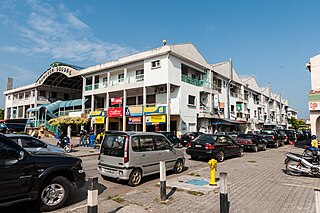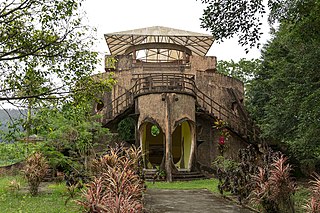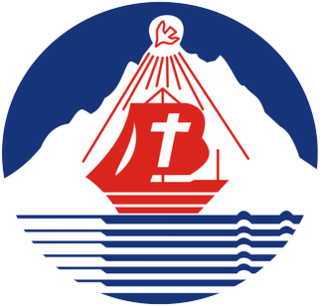
Kota Kinabalu, colloquially referred to as KK, is the state capital of Sabah, Malaysia. It is also the capital of the Kota Kinabalu District as well as the West Coast Division of Sabah. The city is located on the northwest coast of Borneo facing the South China Sea. The Tunku Abdul Rahman National Park lies to its west and Mount Kinabalu, which gave the city its name, is located to its east. Kota Kinabalu has a population of 452,058 according to the 2010 census; when the adjacent Penampang and Tuaran districts are included, the metro area has a combined population of 628,725. The 2020 Census revealed an increase in the municipal population to 500,421, while the wider area including the Penampang and Putatan districts had a population of 731,406.

The Ranau District is an administrative district in the Malaysian state of Sabah, part of the West Coast Division which includes the districts of Kota Belud, Kota Kinabalu, Papar, Penampang, Putatan, Ranau and Tuaran. The capital of the district is in Ranau Town. The landlocked district bordering the Sandakan Division to the east until it meets the Interior Division border. Ranau sits 108 km (67 mi) east of Kota Kinabalu and 227 km (141 mi) west of Sandakan. As of the 2010 Census, the population of the district was 94,092, an almost entirely Dusun ethnic community.

West Coast Division is an administrative division of Sabah, Malaysia. It occupies the northwest portion of Sabah. With an area of 7,588 square kilometres, it occupies 10.3% of Sabah's territory. It also has approximately 30% of Sabah's total population, with the main indigenous inhabitants comprising the Bajau, Bisaya, Bruneian Malay, Dusun, Illanun, Kadazan and Kedayan, as well with a significant numbers of Chinese. The division is divided into the districts of Ranau, Kota Belud, Tuaran, Penampang, Papar, and the state capital Kota Kinabalu. The main towns are as in the names of the districts, plus other towns including Putatan, Inanam, Telipok, Tamparuli, Tenghilan and Kinarut.

Penampang is the capital of the Penampang District in the West Coast Division of Sabah, Malaysia. Its population was estimated to be around 93,616 in 2010, with ethnic Kadazan as the majority. It contains, or is synonymous with, Donggongon, which as of 2007, it has a population of 78,086.

Kadazandusun are the largest ethnic group in Sabah, Malaysia, an amalgamation of the closely related indigenous Kadazan and Dusun peoples. "Kadazandusun" is an umbrella term that encompasses both the Kadazan and Dusun peoples. They are also known as Mamasok Sabah, meaning "indigenous people of Sabah". Kadazandusun tradition holds that they are the descendants of Nunuk Ragang. Kadazandusun is recognised as an indigenous nation of Borneo with documented heritage by the United Nations Educational, Scientific and Cultural Organization (UNESCO) since 2004. Kadazandusuns are part of the bumiputera in Malaysia having been endowed with rights concerning land, rivers, education and maintaining their own customary laws.

Inanam is a suburb and sub-district of Kota Kinabalu in Sabah, Malaysia. It is 10 kilometres from the city centre.

Nunuk Ragang is a site traditionally considered as the location of the original home of the ancestors of the Kadazan-Dusun natives who inhabit most of northern Borneo. The site, nearby a village named Tampias, is located at the intersection of the left and right branches of the Liwagu River to the east of Ranau and Tambunan in Sabah. The two river branches joined up to flow into the Labuk river and drain out into the Sulu Sea. At the site, and under a giant banyan tree, a settlement referred to as Nunuk Ragang was founded. The giant banyan tree was said to be able to give shade to a longhouse sheltering 10 families in it. The legend about Nunuk Ragang had been passed down via oral traditions to the younger generations. No archaeological dig has been carried out to establish the veracity of the legend.

Menggatal or Manggatal is a Malaysian town and suburb of Kota Kinabalu District on the west coast of Sabah. It is an suburb of the state capital, Kota Kinabalu, and is under the jurisdiction of Kota Kinabalu City Hall. It is located along Jalan Tuaran Lama, which is the main road leading north from Kota Kinabalu city centre all the way to neighbouring Tuaran District.

Muhammad Fuad Stephens, was a Malaysian politician who served as the 1st and 5th Chief Minister of Sabah from September 1963 to December 1964 and again briefly from April 1976 to his death in June 1976, 3rd Yang di-Pertua Negara of Sabah from September 1973 to July 1975, 6th High Commissioner of Malaysia to Australia from 1968 to 1973. In addition, he also served as the 1st Huguan Siou or Paramount Leader of the Kadazandusun community. He played a role in bringing Sabah into the Federation of Malaysia in 1963. While he was initially against the idea of Sabah joining in the Federation, given British concerns about the stability of the region and their move to relinquish all their colonies in the post WWII era, he was gradually convinced to work towards it. He held the chief minister's post from 16 September 1963 until 31 December 1964 when he was forced to resign; and again in 1976 for 54 days from 15 April.

Datu Mustapha bin Datu Harun, or Tun Mustapha for short, was a Malaysian politician who served as the 3rd Chief Minister of Sabah from May 1967 to November 1975 and the 1st Yang Di-Pertua Negara from September 1963 to September 1965 and President of the United Sabah National Organisation (USNO). He was an important figure in the negotiations leading to the formation of Malaysia on 16 September 1963.

The Basel Christian Church of Malaysia or BCCM, formerly known as Borneo Basel Self Established Church, is one of the four Lutheran bodies in Malaysia. In 2009 BCCM had 112 congregations nationwide and 63,000 baptised members. In 2023, BCCM had 64,500 members.

Sekolah Menengah Kebangsaan Datuk Peter Mojuntin is one of the secondary schools in Sabah which is located at Penampang, Kota Kinabalu, Malaysia. It is close to Sabah's capital city, Kota Kinabalu.

Greater Kota Kinabalu refers to the dense clusters of regional populated areas surrounding the city of Kota Kinabalu in Malaysia. It comprises the districts of Kota Kinabalu, Penampang, Tuaran and Papar. These districts are also part of the West Coast Division. It was forecasted that in 2019, the combined population of these districts was 1.1 million people, in a combined area of 3,277 km2.

Datuk Peter Joinod Mojuntin, PGDK MLA was a politician in the Malaysian state of Sabah and former State Minister of Local Government and Housing in the government of Tun Fuad Stephens. He died along with other politicians in the Double Six Plane Crash in Kota Kinabalu.

The United Pasokmomogun Kadazan Organisation was a Kadazan-Dusun-Murut (KDM) based political party in North Borneo and later Sabah at the time it became a state of Malaysia in the 1960s.

The Kota Belud District is an administrative district in the Malaysian state of Sabah, part of the West Coast Division which includes the districts of Kota Belud, Kota Kinabalu, Papar, Penampang, Putatan, Ranau and Tuaran. The capital of the district is in Kota Belud Town.

The Kota Kinabalu District is an administrative district in the Malaysian state of Sabah, part of the West Coast Division which includes the districts of Kota Belud, Kota Kinabalu, Papar, Penampang, Ranau and Tuaran. The capital of the district is in Kota Kinabalu City.

The Papar District is an administrative district in the Malaysian state of Sabah, part of the West Coast Division which includes the districts of Kota Belud, Kota Kinabalu, Papar, Penampang, Putatan, Ranau and Tuaran. The capital of the district is in Papar Town.

The Putatan district is an administrative district in the Malaysian state of Sabah, part of the West Coast Division which includes the districts of Kota Belud, Kota Kinabalu, Papar, Penampang, Ranau and Tuaran. The capital of the district is in Putatan Town.


































